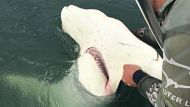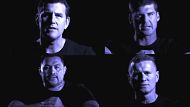A fisherman snagged the catch of his life when he reeled in a mammoth hammerhead shark from the mouth of the Brisbane River on Thursday.
Kurt Ockenfels, 33, had gone out shark fishing with a few friends when his line pulled tight.
More QLD News Videos
Shark 'out of this world'
A 3.2 metre hammerhead shark is caught in the mouth of the Brisbane River.
"I hooked a hammerhead shark and battled it for a good 50 minutes," he said.
"Words can't explain it, I was phenomenally happy because of how rare it is to catch a hammerhead of that size, let alone in the Brisbane River.

"Every waterway has sharks in it but that sort of calibre of shark is rare."
The avid fisherman took the opportunity to tag the 3.2 metre "monstrous" shark with tags issued by the Department of Primary Industries and Bond University shark expert Dr Darryl McPhee.
"Each tag has ID number on it, like a phone number," he said.
"When we brought the shark up to the boat, we tagged it and took a measurement of it from tip of nose to tip of tail, it's sex, the time, date, location of capture, recorded any unusual markings on the shark and the overall health of the shark and took the circle hook out, which is designed to hook a shark in the corner of the mouth only," he said.

"We swam it next to the boat for about two minutes...then let the shark go and it swam off."
The Logan man said he tags every shark over a metre in length and managed to tag about 50 sharks in the Brisbane area alone last September.

"There are a handful of us, I have been pretty lucky that Dr McPhee approached me after he saw my Facebook page and how enthusiastic I was in the conservation side of things," he said.
"Out of all the sharks myself and my friends have tagged, none have been recaptured - that signals that they must have a big area of travel or there are a lot of sharks in the water."
Dr McPhee said it was integral to have recreational fishers tag large sharks.
"The movements of large sharks is important information to have, recreational fishers tagging large animals has occurred for over 30 years," he said.
"It is very important for a number of reasons, one is the information that is generated, the second is the promotion of stewardship, it is an example of citizen science."
Mr Ockenfels said the more we know about sharks, the better off everyone will be at the end of the day.
"Where does a shark go, where does a shark breed, that is unknown, we don't know how they travel and that is why we do it," he said.
"That hammerhead, if she gets recaptured, it would be great if it was recaptured outside of Brisbane because that would give us an idea of how they travel."













